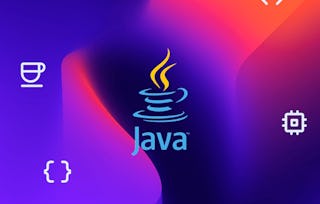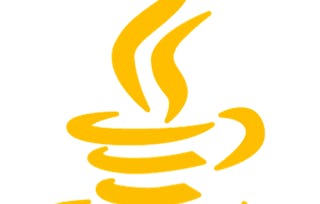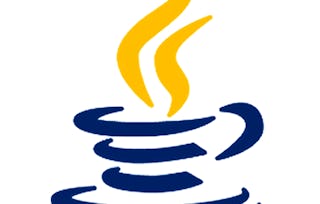Java Class Library est le quatrième et dernier cours de la spécialisation Java de base. La spécialisation Java de base fait partie d'une série de spécialisations en programmation, dérivées des Bootcamps Java privés de LearnQuest, conçues pour fournir l'ensemble des compétences nécessaires pour être embauché en tant que développeur informatique utilisant Java dans de nombreux environnements d'entreprise.

Bibliothèque de classes Java

Bibliothèque de classes Java
Ce cours fait partie de Spécialisation Core Java
Enseigné en Français (doublage IA)


Instructeurs : Evan Bergman
22 281 déjà inscrits
Inclus avec
221 reviews
Expérience recommandée
Compétences que vous acquerrez
- Catégorie : Programmation Java
- Catégorie : Cadres d'application
- Catégorie : Fichier E/S
- Catégorie : Persistance des données
- Catégorie : Débogage
- Catégorie : Programmation orientée objet (POO)
- Catégorie : structures de données
Détails à connaître

Ajouter à votre profil LinkedIn
21 devoirs
Découvrez comment les employés des entreprises prestigieuses maîtrisent des compétences recherchées

Élaborez votre expertise du sujet
- Apprenez de nouveaux concepts auprès d'experts du secteur
- Acquérez une compréhension de base d'un sujet ou d'un outil
- Développez des compétences professionnelles avec des projets pratiques
- Obtenez un certificat professionnel partageable

Il y a 7 modules dans ce cours
Ce module fournit une vue d'ensemble du cours Core Java - Java Class Library. Dans ce cours, nous couvrirons les caractéristiques du langage qui permettent la bibliothèque de classes, les domaines essentiels de la bibliothèque, et nous fournirons des feuilles de route pour les domaines d'auto-exploration. Dans ce module, nous découvrirons une fonctionnalité majeure de Java, les Génériques (connus sous le nom de modèles ou de types paramétrés dans d'autres langages), introduite dans Java 5. Les génériques sont un outil clé pour assurer la sécurité des types.
Inclus
2 vidéos3 lectures1 laboratoire non noté
Dans ce module, nous allons découvrir une fonctionnalité majeure de Java, les génériques (connus sous le nom de modèles ou de types paramétrés dans d'autres langages), introduite dans Java 5. Les générateurs sont un outil essentiel pour garantir la sécurité des types.
Inclus
14 vidéos7 lectures5 devoirs2 laboratoires non notés
Dans ce module, nous allons parler des classes Collection de Java, qui fournissent des outils puissants pour gérer des collections de données. Les collections offrent beaucoup plus de flexibilité et de fonctionnalités que les simples tableaux linéaires que nous avons utilisés jusqu'à présent. De plus, les flux Java (java.util.stream) introduisent une nouvelle façon de traiter les données dans un style fonctionnel, ce qui facilite le travail avec les collections d'une manière plus expressive et plus efficace.
Inclus
11 vidéos6 lectures5 devoirs1 laboratoire non noté
Les différents modèles de programmation gèrent les conditions d'erreur de différentes manières. Certains, par exemple, exigent des programmeurs qu'ils vérifient les codes d'erreur après chaque appel de fonction. Java, s'inspirant d'autres environnements tels que C++, adopte une approche différente, connue sous le nom de gestion des exceptions. Dans ce module, vous découvrirez comment Java gère les exceptions et apprendrez à la fois à gérer et, le cas échéant, à créer des exceptions.
Inclus
12 vidéos8 lectures6 devoirs1 laboratoire non noté
Java possède de riches capacités d'entrée et de sortie (E/S), qui ont constamment évolué au fil des ans. Java peut gérer les E/S réseau, les E/S fichier, les E/S bloquantes et non bloquantes, etc. Dans ce module, nous présenterons une vue d'ensemble des E/S et nous nous concentrerons principalement sur les E/S textuelles simples à l'aide de fichiers. Nous jetterons également un bref coup d'œil sur les améliorations considérables apportées aux E/S dans Java 7 et Java 8, avec des lectures pour fournir des informations supplémentaires.
Inclus
7 vidéos8 lectures2 devoirs1 laboratoire non noté
Les Enums Java nous permettent de créer un ensemble fixe de valeurs constantes. Ce sont des objets, ils peuvent donc avoir des méthodes et des propriétés, mais il s'agit néanmoins d'un ensemble fixe et constant. Les plus simples d'entre eux peuvent simplement correspondre aux couleurs d'un jeu de cartes, mais nous allons examiner plus en détail leurs capacités et la manière dont vous pouvez les utiliser.
Inclus
3 vidéos4 lectures1 devoir1 laboratoire non noté
Les annotations sont un moyen d'attacher des méta-données au code Java. Ajoutée dans Java 5, cette fonctionnalité de métadonnées passives peut ne pas sembler importante à première vue, mais elle est la clé du fonctionnement des cadres Java modernes. Spring, Spring Boot, Spring Cloud, NetFlix OSS, Java Persistence Architecture, Jakarta EE (né Java EE) containers, JAX-WS, JAX-RS, et tant d'autres. Dans ce module, nous examinerons la technologie des annotations Java, les annotations existantes et, dans le laboratoire, nous créerons une annotation personnalisée et écrirons du code pour voir cette annotation au moment de l'exécution. Cela signifie que vous aurez non seulement la capacité d'utiliser les annotations, mais aussi au moins les rudiments nécessaires pour écrire et traiter vos propres annotations, si vous en avez besoin.
Inclus
5 vidéos7 lectures2 devoirs1 laboratoire non noté
Obtenez un certificat professionnel
Ajoutez ce titre à votre profil LinkedIn, à votre curriculum vitae ou à votre CV. Partagez-le sur les médias sociaux et dans votre évaluation des performances.
Instructeurs


Offert par
En savoir plus sur Développement de logiciels
 Statut : Essai gratuit
Statut : Essai gratuitLearnQuest
 Statut : Essai gratuit
Statut : Essai gratuitLearnQuest
 Statut : Essai gratuit
Statut : Essai gratuitAmazon
 Statut : Essai gratuit
Statut : Essai gratuitLearnQuest
Pour quelles raisons les étudiants sur Coursera nous choisissent-ils pour leur carrière ?

Felipe M.

Jennifer J.

Larry W.

Chaitanya A.
Avis des étudiants
- 5 stars
77,82 %
- 4 stars
17,19 %
- 3 stars
4,07 %
- 2 stars
0,45 %
- 1 star
0,45 %
Affichage de 3 sur 221
Révisé le 31 déc. 2021
I understood many of these topics already but I got much more a detailed comprehension.
Révisé le 30 nov. 2022
This course makes you self-sufficient to continue explore Java platform on your own.
Révisé le 27 juil. 2021
Excelent course, i learned a lot and i think that if you follow the lectures you get a solid base to start programming right away

Ouvrez de nouvelles portes avec Coursera Plus
Accès illimité à 10,000+ cours de niveau international, projets pratiques et programmes de certification prêts à l'emploi - tous inclus dans votre abonnement.
Faites progresser votre carrière avec un diplôme en ligne
Obtenez un diplôme auprès d’universités de renommée mondiale - 100 % en ligne
Rejoignez plus de 3 400 entreprises mondiales qui ont choisi Coursera pour les affaires
Améliorez les compétences de vos employés pour exceller dans l’économie numérique
Foire Aux Questions
Pour accéder aux supports de cours, aux devoirs et pour obtenir un certificat, vous devez acheter l'expérience de certificat lorsque vous vous inscrivez à un cours. Vous pouvez essayer un essai gratuit ou demander une aide financière. Le cours peut proposer l'option "Cours complet, pas de certificat". Cette option vous permet de consulter tous les supports de cours, de soumettre les évaluations requises et d'obtenir une note finale. Cela signifie également que vous ne pourrez pas acheter un certificat d'expérience.
Lorsque vous vous inscrivez au cours, vous avez accès à tous les cours de la spécialisation et vous obtenez un certificat lorsque vous terminez le travail. Votre certificat électronique sera ajouté à votre page Réalisations - de là, vous pouvez imprimer votre certificat ou l'ajouter à votre profil LinkedIn.
Oui, pour certains programmes de formation, vous pouvez demander une aide financière ou une bourse si vous n'avez pas les moyens de payer les frais d'inscription. Si une aide financière ou une bourse est disponible pour votre programme de formation, vous trouverez un lien de demande sur la page de description.
Plus de questions
Aide financière disponible,

